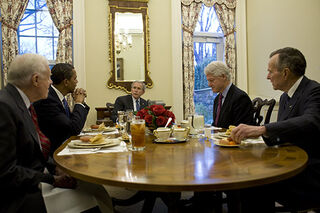Health
The 'Boomerang' Effect of Vaccinating Public Figures
"Boomerang" effect psychology explains why health campaigns can backfire.
Posted December 5, 2020 Reviewed by Ekua Hagan
Three former U.S. Presidents—Barack Obama, Bill Clinton, and George W. Bush—have apparently agreed to be televised taking the COVID vaccine. It’s just the first of perhaps many dramatic attempts to encourage the public to be vaccinated.

Obama is quoted in The Guardian: "… I may end up taking it on TV or having it filmed, just so that people know that I trust this science." George W. Bush’s chief of staff told CNN that the former president is prepared to take the vaccine on camera "… to help encourage his fellow citizens to get vaccinated." Clinton’s press secretary also revealed that he too is set to be videoed as he receives the vaccine, explaining, "He will do it in a public setting if it will help urge all Americans to do the same."
These are supposedly high credibility individuals; why would they endanger their own lives if the vaccine was dicey? The public relations strategy behind the frenetic push to get the vaccine accepted could not be more brazen.
But do these proposed media stunts in fact reveal mounting anxiety behind the scenes—anxiety that not enough people will agree to be vaccinated, so prolonging the pandemic? Now that a vaccine is practically here, it may be that the major barrier remains to get enough of the population to take it.
Why is that so important? Have we not already overcome the biggest hurdle to killing COVID-19: achieving an effective vaccine? From now on, surely life is going to get easier?
But it turns out that if you want to end an epidemic, the effectiveness of a vaccine becomes less important than the number of people taking it up.
A new study from the Yale School of Public Health and Harvard Medical School used a mathematical simulation of vaccination and uncovered that implementation contributed much more to the success of vaccination programs, compared with a vaccine’s effectiveness.
The investigation, entitled, "Clinical Outcomes of a COVID-19 Vaccine: Implementation Over Efficacy," found that the benefits of a vaccine decline considerably in the face of manufacturing or deployment delays or substantial vaccine hesitancy.
A poll by Gallup, as reported in The Guardian and released in mid-November, revealed that in the U.S., 42 percent of the population said they would not take the vaccine, even if it was "available right now at no cost."
But will the impact of three former U.S. presidents being vaccinated and similar publicity stunts deliver?
Psychologists who have studied how to overcome public resistance in similar predicaments have uncovered a famous "boomerang" effect; the tendency for public health campaigns to spectacularly backfire, and produce the opposite outcome to that intended.
A study entitled "Government Health Warnings and the 'Boomerang' Effect," for example, found that the old-fashioned written government health warning on cigarette advertisements, can indeed ‘boomerang’, leading to an increased desire to smoke. Published in the journal Psychological Reports, the research established that health warnings in cigarette advertising increased the desire to smoke, with the amplified yearning even greater for smokers than for non-smokers.
There has been a shift in recent years to deploying graphic imagery on cigarette packets, including vivid pictures of diseased lungs, mouths, people dying of lung cancer, and even corpses.
However, even these tactics have been found to back-fire, or "boomerang." A study from a team at the University of Illinois at Urbana-Champaign found using cigarette packet graphic imagery resulted in unintended effects, potentially wreaking the intended message. A significant number of people felt their sense of freedom was threatened, with increased negative perceptions of the source as domineering, along with more anger as well.
As we value freedom and choice (perhaps particularly in the US and maybe throughout the western world), so dogmatic, explicit, or forceful messages might arouse an emotional reaction against them, particularly if we feel our autonomy is threatened. Maybe it was this psychological thinking which lay behind President-elect Joe Biden announcing Americans won't be forced to take a vaccine.
Far East societies such as South Korea, China, and Taiwan demonstrated much better results, compared to the West, on all counts, earlier in the pandemic, maybe because their citizenry were more willing to give up freedoms, so their test and tracing, as well lockdowns, were more total and comprehensive.
A widening chasm in outcomes as vaccinating gets rolled out across the world might be revealed, for very similar cultural reasons. Vaccines could then widen the gap in economic and health performance, between advanced capitalist societies in the East and the West.
Researchers Aharon Levy and Yossi Maaravi from the University of Groningen, The Netherlands and The Interdisciplinary Center, Israel, account for the 'boomerang' effect by invoking the notion we are all driven by powerful innate needs to preserve a positive self-image. When confronted with information that our prior beliefs were wrong, this threatens an image of ourselves, which we want to project, that we are consistent, reasonable, and rational people.
Their study entitled, ‘The boomerang effect of psychological interventions’, concludes that this psychological background means we become energised to justify our beliefs, even more strongly, so resisting change. To adopt the new opposing position has negative connotations for the impression we want to maintain of ourselves publicly.
The mistake that the mass immunisation strategy against Covid seems to be in grave danger of making is that attitudes to vaccination are often central to people’s sense of themselves; attacking them may backfire.
A study entitled "Populist politics and vaccine hesitancy in Western Europe: An analysis of national-level data" found a highly significant positive association between the percentage of people in a country who voted for populist parties, and the proportion who believe that vaccines are not important and effective. Populist politics seeks to divide the world into masses and elites, claiming to represent the former, while opposing the latter.
Published in the European Journal of Public Health, the study also found there was a similar association between populist party support and the percentage of people who think vaccines are unsafe, but it wasn’t quite as strong as the other two associations.
The study author, Jonathan Kennedy, from Queen Mary University of London, concludes that vaccine hesitancy and political populism may be driven by similar psychological forces: a profound distrust in elites and experts.
Using elites, and you can’t get more elite than three former US Presidents, to ram home your message, may therefore backfire.
The vaccination strategy might "boomerang," relying as it does on experts to originate the tactics.
Maybe this is because these very authorities have never themselves been more psychologically quarantined, from the very population they are trying to inoculate.
Dr. Peter Bruggen passed away in 2018. While this post was written by Dr. Raj Persaud, Dr. Bruggen's name is retained biographically as a tribute to his contributions overall.
References
Clinical Outcomes Of A COVID-19 Vaccine: Implementation Over Efficacy A. David Paltiel, Jason L. Schwartz, Amy Zheng, and Rochelle P. Walensky. HEALTH AFFAIRS AHEAD OF PRINT. PUBLISHED:NOVEMBER 19, 2020 https://doi.org/10.1377/hlthaff.2020.02054
Government Health Warnings and the “Boomerang” Effect. Michael Hyland, James Birrell. Psychological Reports Vol 44, Issue 2, 1979 First Published April 1, 1979 Research Article Find in PubMed https://doi.org/10.2466/pr0.1979.44.2.643
Are Graphic Cigarette Warning Labels an Effective Message Strategy? A Test of Psychological Reactance Theory and Source Appraisal Nicole R. LaVoie, Brian L. Quick, Julius M. Riles and Natalie J. Lambert. Communication Research 2017, Vol. 44(3) 416–436
Obama, Clinton and Bush pledge to take Covid vaccine on TV to show its safety Adam Gabbatt @adamgabbatt Thu 3 Dec 2020 16.18 GMT https://www.theguardian.com/us-news/2020/dec/03/obama-clinton-bush-covi…
Aharon Levy & Yossi Maaravi (2018) The boomerang effect of psychological interventions. Social Influence, 13:1, 39-51, DOI: 10.1080/15534510.2017.1421571
Populist politics and vaccine hesitancy in Western Europe: an analysis of national-level data Jonathan Kennedy European Journal of Public Health, Volume 29, Issue 3, June 2019, Pages 512–516, https://doi.org/10.1093/eurpub/ckz004




